新概念英语第一册83-84课课件
合集下载
新概念一Lesson 83-84 ppt课件
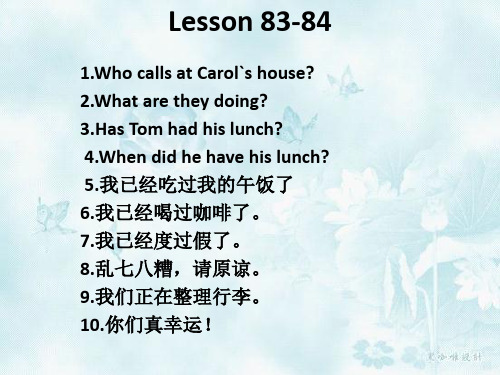
电影
film n.胶卷,底片
Please give me a roll of film. 请给我一卷胶卷。
film v.拍电影
I have filmed . 我拍过电影。
★ beautiful adj.
adj. 美丽的,漂亮的
a beautiful flower 美丽的花 a beautiful woman 美丽的女人
★cinema n.电影院
cinthe cinema tomorrow.(movie theater <美语>电影院) 明天我们打算去电影院。
film n.电影
a film star 电影明星
see the film 看电影
make a film拍
London 伦敦
Tokyo 东京
Washington 华盛顿 Sydney 悉尼
巴黎凯旋门
(Triumphal Arch [trai'Λmfel a:k])
• 凯旋门坐落在巴黎西北面的戴高乐 广场,12条大街以它为中心放射形 散开,因此,戴高乐广场也称星际广 场。 凯旋门的建造,始于古罗马。 1806年2月22日,拿破仑一世在欧斯 代尔利茨战役中打败了奥俄联军, 凯旋回国,经过星际广场,在国民的 欢呼声中,...
Lesson 83-84
1.Who calls at Carol`s house? 2.What are they doing? 3.Has Tom had his lunch? 4.When did he have his lunch? 5.我已经吃过我的午饭了 6.我已经喝过咖啡了。 7.我已经度过假了。 8.乱七八糟,请原谅。 9.我们正在整理行李。 10.你们真幸运!
新概念英语第一册83-84课课件

7/15/2015
Revision
• Grammar 句型 • 句型一 他正在洗澡。 He is having a bath. • 句型二 他在楼上。 He is upstairs. • 句型三 我和山姆一起吃午饭了。 Sam and I had lunch together today. • 句型四 你早饭/午饭/晚饭吃什么了? What did you have for .1. 自找麻烦 rock the boat • 2. 有麻烦 in hot water • 3. 祸从口出 put one's foot in one's mouth
7/15/2015
Revision
• • • • • • • •
• Words and Phrases 单词 • bath 洗澡 • restaurant 饭店,餐馆 • ready 准备好的 • nearly 几乎 • roast 烤的 • holiday 假日 • haircut 理发 • breakfast 早饭
• 萨拉丢掉工作和房子后变得穷困潦 倒。 • Sarah was down and out after losing her job and her apartment.
7/15/2015
• have a bone to pick with 有账要算 我有账跟你算.你还欠我十五美金没还呢 I have a bone to pick with you. You still owe(欠) me the fifteen dollars.
7/15/2015
Revision
我不要打 盹!!!我不 要打盹!!我 不要打 盹!。。。。
7/15/2015
课文导入 Lead In
Revision
• Grammar 句型 • 句型一 他正在洗澡。 He is having a bath. • 句型二 他在楼上。 He is upstairs. • 句型三 我和山姆一起吃午饭了。 Sam and I had lunch together today. • 句型四 你早饭/午饭/晚饭吃什么了? What did you have for .1. 自找麻烦 rock the boat • 2. 有麻烦 in hot water • 3. 祸从口出 put one's foot in one's mouth
7/15/2015
Revision
• • • • • • • •
• Words and Phrases 单词 • bath 洗澡 • restaurant 饭店,餐馆 • ready 准备好的 • nearly 几乎 • roast 烤的 • holiday 假日 • haircut 理发 • breakfast 早饭
• 萨拉丢掉工作和房子后变得穷困潦 倒。 • Sarah was down and out after losing her job and her apartment.
7/15/2015
• have a bone to pick with 有账要算 我有账跟你算.你还欠我十五美金没还呢 I have a bone to pick with you. You still owe(欠) me the fifteen dollars.
7/15/2015
Revision
我不要打 盹!!!我不 要打盹!!我 不要打 盹!。。。。
7/15/2015
课文导入 Lead In
新概念英语第一册Lessons83-84课件
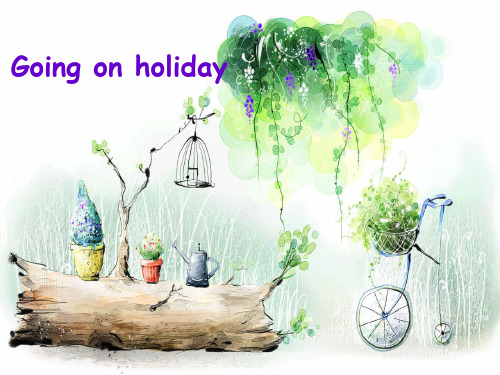
• 每日一笑
Dragon born dragon , chicken born chicken , mouse’s son can make hole !
• 每日一笑
If you want money , I have no.
If you want life , I have one .
at 4 o’clock.
Would you like some ice-creams?
No, thanks. I’ve had an icecream. I had an ice-cream at four o’clock.
I’ve already had some/ one... I haven’t / She hasn’t had any ... Have you had any…?
2021/8/23
(2) n. 背包,行李包
Her pack is cute.
2021/8/23
★ suitcase [ˈsu:tkeɪs] n.手提箱
2021/8/23
★ already [ɔ:lˈredi] adv.已经
I have had lunch already. 我已经吃完午饭了。
2.have lunch with sb. 和某人一起吃午饭
We're having lunch with John today. 我们今天和约翰一起共进午餐。
Have you had…? 你已经...了吗?
Read the 2 stories:
<Ⅰ>
He had a piece of pizza at 5 o’clock. He is full.
I had at half past twelve. CAROL:Have a cup of coffee then. SAM:I've just had a cup, thank you. I had one after my lunch. TOM: Let's go into the living room, Carol.
新概念英语第一册83-84课课件
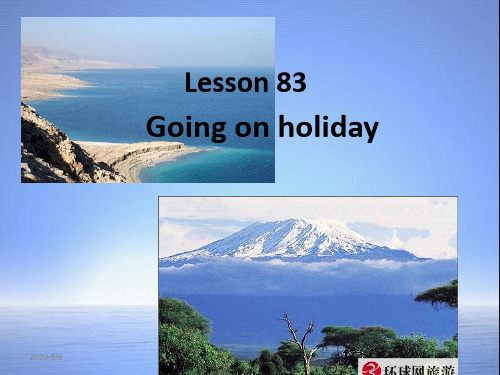
他想买一双舒适的鞋子。 He wants to buy a pair of comfortable shoes.
I’ve = I have You’ve = You have They’ve = They have He’s = He has She’s = She has We’ve = We have
1. I’ve already had lunch.
我已经吃过饭了。 2. I had lunch at half past twelve. 我在12点半吃的。 第一句话是现在完成时,现在完 成时表示过去发生的事情对现在 的影响,包含着“画外音”(我 不用再吃饭了)。
第二句话是一般过去时。如果仅 仅是表达在过去的什么时间做了 某事,特别是有具体的过去时间 状语的情况下,则用一般过去时。
3) 表示过去已经开始, 持续到现在, 也许还会继续下去的动作 或状态,常与包括现在在内的一段时间的状语连用。 She has learned English for 5 years. He has lived in Beijing since he was born .
Has he lived in Shenzhen for 4 years?
• 清理散乱的东西 • clear up the mess
★pack v. 包装,打包,装箱 ① v. 打包,装箱 • pack one’s suitcase 打包 • pack one’s suitcases 收拾行李。 ② v. 挤满,塞满 • 大厅里挤满了影迷。 • The movie fans packed the hall. • 公共汽车里挤满了人。 • The bus is packed with people.
uncomfortable = un- + comfortable
最新新概念英语第一册83-84课课件教学讲义PPT课件

• We’re going to leave tomorrow. • = We’re leaving tomorrow. • 当动词是leave, go, come, arrive等时,
可以用现在进行时表将来。
• I’m coming. • 他今天晚上就到 • He’s arriving tonight.
• 清理散乱的东西 • clear up the mess • He was such a mess that he did not
know what to do. • 他心乱得不知如何是好
★pack v. 包装,打包,装箱 ① v. 打包,装箱
• pack one’s suitcase 打包 • pack one’s suitcases 收拾行李。
• Let’s hold a meeting.
• untidy = messy • tidy-untidy • happy-unhappy • comfortable-uncomfortable • lucky-unlucky • like-unlike • sure-unsure • 单词前加“un”表示否定前缀
现在完成时VS一般过去时
时间最不偏私,给任何人都是二十 四小时;时间也最偏私,给任何人
都不二十四小时(赫胥黎)
勤奋的人是时间 的主人,懒惰的 人是时间的奴隶
清华学霸——马冬晗(姐姐)、马冬昕(妹妹 )
籍贯:中国,辽宁省 出生年月:1989.11 所在院校: 马冬晗(姐姐)清华大学,精仪系81班——
② v. 挤满,塞满 • 大厅里挤满了影迷。
• The movie fans packed the hall. • 公共汽车里挤满了人。
• The bus is packed with people.
新概念英语第一册83-84课ppt课件
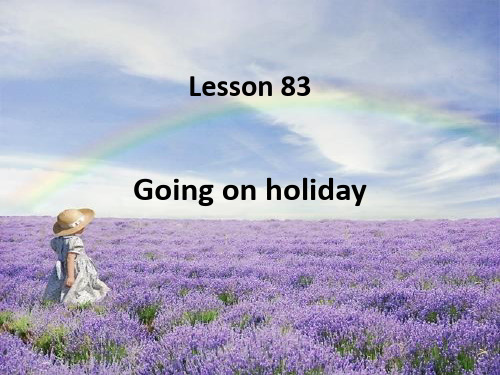
最新版整理ppt
6
现在完成时
1、含义 (1)在过去一个不确定的时间里发生,并 与现在有着某种联系的动作(强调过去发生 的事对现在的影响)。 (2)开始于过去并持续到现在的动作,也 有可能继续下去。
最新版整理ppt
7
2、构成
• 肯定句: has/have + 动词的过去分词
• 否定形式:hasn't/haven't + 动词的过去分 词
• 抽根烟
• Have a cigarette
• 洗个澡
• Have a bath
• 喝杯橙汁
最新版整理ppt
10
• with sb. 和某人一起。
• 我每天早上和Lucy一起上班
• I go to work with Lucቤተ መጻሕፍቲ ባይዱ every morning. • 你也跟我们一道来吗?
• Will you come with us, too?
• The bus is packed with people.
最新版整理ppt
5
★leave v. 离开 ① v. 离开,出发
• 火车还有5分钟就开了。 • The train is going to leave in 5 minutes.
② v. 舍弃;脱离 ③ v. 留给,遗留;委托 • ‘Leave it to me,’he said. • “这事交给我来办吧,”他说道。 • 不要把工作留到明天才做 • Don't leave your work till tomorrow.
• 他们已经吃过蔬菜了 吗?
• Have they had any vegetables?
• 他们没吃早饭呢。
新概念英语NCE_Lesson83-84(共30页)课件
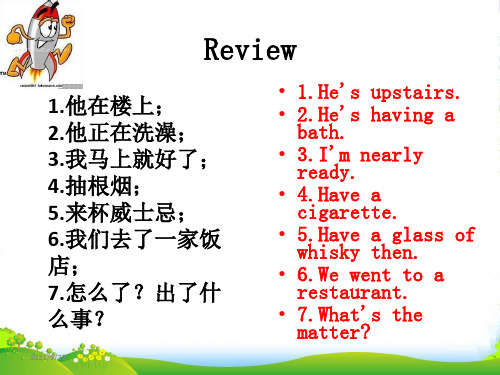
cigarette. • 5.Have a glass of
whisky then. • 6.We went to a
restaurant. • 7.What's the
matter?
• 1. Have实义动词 • 吃早饭 • have breakfast
• 抽根烟 • have a cigarette
以下省略
What’s your holiday plan?
•9、阅读使人充实,会谈使人敏捷,写作与笔记使人精确……史鉴使人明智;诗歌使人巧慧2021/9/252021/9/25Saturday, September 25, 2021 •10、每一本书是一级小阶梯,我每爬上一级,就更脱离畜生而上升到人类,更接近美好生活的观念,更热爱书籍。2021/9/252021/9/252021/9/259/25/2021 9:44:55 PM •11、书是人类进步的阶梯,终生的伴侣,最诚挚的朋友。2021/9/252021/9/252021/9/25Sep-2125-Sep-21 •12、阅读一本不适合自己阅读的书,比不阅读还要坏。我们必须会这样一种本领,选择最有价值、最适合自己所需要的读物。2021/9/252021/9/252021/9/25Saturday, September 25, 2021 13、He who seize the right moment, is the right man.谁把握机遇,谁就心想事成。2021/9/252021/9/252021/9/252021/9/259/25/2021 •14、谁要是自己还没有发展培养和教育好,他就不能发展培养和教育别人。2021年9月25日星期六2021/9/252021/9/252021/9/25 •15、一个爱书的人,他必定不致缺少一个忠实的朋友,一个良好的老师,一个可爱的伴侣,一个优婉的安慰者。2021年9月2021/9/252021/9/252021/9/259/25/2021 •16、提出一个问题往往比解决一个更重要。因为解决问题也许仅是一个数学上或实验上的技能而已,而提出新的问题,却需要有创造性的想像力,而且标志着科学的真正进步。 2021/9/252021/9/25September 25, 2021 •17、看文字须大段精彩看,耸起精神,竖起筋骨,不要困,如有刀剑在后一般。就一段中须要透;击其首则尾应,击其尾则首应,方始是。不可按册子便在,掩了册子便忘。 2021/9/252021/9/252021/9/252021/9/25
whisky then. • 6.We went to a
restaurant. • 7.What's the
matter?
• 1. Have实义动词 • 吃早饭 • have breakfast
• 抽根烟 • have a cigarette
以下省略
What’s your holiday plan?
•9、阅读使人充实,会谈使人敏捷,写作与笔记使人精确……史鉴使人明智;诗歌使人巧慧2021/9/252021/9/25Saturday, September 25, 2021 •10、每一本书是一级小阶梯,我每爬上一级,就更脱离畜生而上升到人类,更接近美好生活的观念,更热爱书籍。2021/9/252021/9/252021/9/259/25/2021 9:44:55 PM •11、书是人类进步的阶梯,终生的伴侣,最诚挚的朋友。2021/9/252021/9/252021/9/25Sep-2125-Sep-21 •12、阅读一本不适合自己阅读的书,比不阅读还要坏。我们必须会这样一种本领,选择最有价值、最适合自己所需要的读物。2021/9/252021/9/252021/9/25Saturday, September 25, 2021 13、He who seize the right moment, is the right man.谁把握机遇,谁就心想事成。2021/9/252021/9/252021/9/252021/9/259/25/2021 •14、谁要是自己还没有发展培养和教育好,他就不能发展培养和教育别人。2021年9月25日星期六2021/9/252021/9/252021/9/25 •15、一个爱书的人,他必定不致缺少一个忠实的朋友,一个良好的老师,一个可爱的伴侣,一个优婉的安慰者。2021年9月2021/9/252021/9/252021/9/259/25/2021 •16、提出一个问题往往比解决一个更重要。因为解决问题也许仅是一个数学上或实验上的技能而已,而提出新的问题,却需要有创造性的想像力,而且标志着科学的真正进步。 2021/9/252021/9/25September 25, 2021 •17、看文字须大段精彩看,耸起精神,竖起筋骨,不要困,如有刀剑在后一般。就一段中须要透;击其首则尾应,击其尾则首应,方始是。不可按册子便在,掩了册子便忘。 2021/9/252021/9/252021/9/252021/9/25
新概念英语第一册课件NCE_Lesson83-84(共93页)——shirley

6. 分钟在前的时间的表达法。 前点前用 past 2:10
ten past two 半点用 half past
3:30
half past three 半点后用to 表达“差几分几点(小时+1)”
5:55
five to six
时间表达法:
• [1] 顺读法: • [2] 逆读法:
[1] 顺读法:
n.洗澡 ad.几乎,将近 a.准备好的,完好的 n.正餐,晚餐 n.饭馆,餐馆 a.烤的
n.早饭 n.理发 n.聚会
n.假日
Revision
1. Everyone says a phrase of “have”
2. Answer my questions: ①. Where’s Tom? What’s he doing? ②. What did Sam have? ③. Is dinner ready? ④. What time can they have dinner? ⑤. Where did they have lunch? ⑥. What are they going to have tonight?
★ already adv.已经(现完标志)
1.我已经吃过我的早饭了。 I have already had my breakfast.
already 用于肯定句 yet用于否定句或疑问句,表示还没有。
我还没有吃早饭。 I have not had my breakfast yet.
你吃过早饭了吗? Have you had your breakfast yet ?
suitcase
suitcase n. 手提箱 /’su:tkeis/
bookcase
showcase
ten past two 半点用 half past
3:30
half past three 半点后用to 表达“差几分几点(小时+1)”
5:55
five to six
时间表达法:
• [1] 顺读法: • [2] 逆读法:
[1] 顺读法:
n.洗澡 ad.几乎,将近 a.准备好的,完好的 n.正餐,晚餐 n.饭馆,餐馆 a.烤的
n.早饭 n.理发 n.聚会
n.假日
Revision
1. Everyone says a phrase of “have”
2. Answer my questions: ①. Where’s Tom? What’s he doing? ②. What did Sam have? ③. Is dinner ready? ④. What time can they have dinner? ⑤. Where did they have lunch? ⑥. What are they going to have tonight?
★ already adv.已经(现完标志)
1.我已经吃过我的早饭了。 I have already had my breakfast.
already 用于肯定句 yet用于否定句或疑问句,表示还没有。
我还没有吃早饭。 I have not had my breakfast yet.
你吃过早饭了吗? Have you had your breakfast yet ?
suitcase
suitcase n. 手提箱 /’su:tkeis/
bookcase
showcase
- 1、下载文档前请自行甄别文档内容的完整性,平台不提供额外的编辑、内容补充、找答案等附加服务。
- 2、"仅部分预览"的文档,不可在线预览部分如存在完整性等问题,可反馈申请退款(可完整预览的文档不适用该条件!)。
- 3、如文档侵犯您的权益,请联系客服反馈,我们会尽快为您处理(人工客服工作时间:9:00-18:30)。
Lesson 83
• Going on holiday
2015/10/29
Maldives
2015/10/29
2015/10/29
2015/10/29
本课内容
• • • • • • • 单词学习 现在完成时 课文讲解 练习 日常用语 口语练习 作业
Review
1.他在楼上; 2.他正在洗澡; 3.我马上就好了; 4.抽根烟; 5.来杯威士忌; 6.我们去了一家饭 成 • 肯定句:主语+ has/have + 动词的过去分词 • 否定形式:主语+hasn't/haven't + 动词的过 去分词 • 疑问形式:把 has/have 提前 • 我已经吃过早饭了。 • I have had breakfast. • 我没吃早饭呢。 • I haven’t had breakfast. • 你吃早饭了吗? • Have you had breakfast?
★already adv. 1.我已经吃过早饭了。 I have already had my breakfast. already 用于肯定句 2.yet用于否定句或疑问句,表示还没有。 我还没有吃早饭。 I have not had my breakfast yet. 你吃过早饭了吗? Have you had your breakfast yet ?
• 5.Tom and I are going to have a holiday. • 说两个人的顺序时,一般把别人放在自己之 前,以示尊敬。 • be going to do sth. 一般将来时(表示计划、打 算做某事)。 • have a holiday 度假【回顾】have的用法。 • 6. Aren’t you lucky! 你们可真幸运哪! • 貌似否定疑问句的感叹句。 • 7. I’ve already had my holiday this year. 现在完成 时(画外音:我今年不能再休假了。)
2015/10/29
• 8.-Where did you go? -I stayed at home. 一 般现在时(仅仅是谈论过去某时发生的事 )。 • 这里的home是名词,前面用介词at,但不 用加冠词the。 • 而在go home, arrive home中home是地点副 词,所有前面不加介词。
2015/10/29
Listening comprehension
2015/10/29
Reading
• Where did Sam go for his holiday this year? • Why doesn’t Sam want to have lunch with them? • What time did Sam have lunch? • Has Sam already had a cup of coffee?
• • • • • • • • • 我每天早上和Lucy一起上班 I go to work with Lucy every morning. 你也跟我们一道来吗? Will you come with us, too? Let’s do sth 让我们…… 我们走 Let’s go. 我们开个会吧 Let’s hold a meeting.
2015/10/29
课文讲解
• • • • • • • • • 1. Have实义动词 吃早饭 Have breakfast 抽根烟 Have a cigarette 洗个澡 Have a bath 喝杯橙汁 Have a glass of orange juice
• 2.with sb. 和某人一起。
Homework
• • • • 1.朗读背诵83课, 2.抄写83-84课单词每个5遍 3. 完成课后84课课后练习 4.总结现在完成时用法与一般过去时的用法
Daily English No pains no gains.
不劳无获。
Lesson 84 Have you had ......?
2015/10/29
• Example: • 1. Have you had any vegetables ? • I haven’t had any vegetables. • I have just had some fruit.
2015/10/29
Leading
• Where did you go on holiday before?
• Where are you going to go on holiday this year?
2015/10/29
单词学习
• mess /mes/ n. 杂乱,凌乱 • pack/pæ k/ v.包装,打包,装箱 • suitcase/'sju:tkeis/ n. 手提箱 • leave/li:v/ v. 离开 • already adv. 已经
2015/10/29
现在完成时态练习题
• have /has been to 曾经去过某地回来了 • have /has gone to 去过某地还没回来 • have /has been in 一直待在某地
2015/10/29
Summary
• • • • VOC: mess /mes/ n. 杂乱,凌乱 pack/pæ k/ v.包装,打包,装箱 suitcase/'sju:tkeis/ n. 手提箱 • leave/li:v/ v. 离开 • already/a:l'redi/ adv. 已经 G/P:现在完成时
2015/10/29
• • • • • • • • •
3. untidy = messy tidy-untidy happy-unhappy comfortable-uncomfortable lucky-unlucky sure-unsure fair-unfair 单词前加“un”表示否定前缀
2015/10/29
Let’s play
2015/10/29
Fruit
Bananas
Oranges
Cabbages
Peaches
Peas
Vegetables Lettuce
Meat
Milk
Beef
Tea
Lamb
Coffee
Steak
Wine
2015/10/29
现在完成时
1、含义 (1)在过去一个不确定的时间里发生,并 与现在有着某种联系的动作 (2)开始于过去并持续到现在的动作。
2015/10/29
• 1.He's upstairs. • 2.He's having a bath. • 3.I'm nearly ready. • 4.Have a cigarette. • 5.Have a glass of whisky then. • 6.We went to a restaurant. • 7.What's the matter?
• 2. Have you had any beef? • I haven’t had any beef. • I have just had some chicken.
2015/10/29
• 3. Has he had any tea? • He hasn’t had any tea. • He has just had some coffee.
2015/10/29
Role play
• 1. pronunciation • 2. tools you are using • 3. cooperation
2015/10/29
Grammar
2015/10/29
★mess n. 杂乱,凌乱 • 乱七八糟,请原谅。 • Excuse the mess. • The room is in a mess. • 那个房间乱七八糟 清理散乱的东西 • clear up the mess • He was such a mess that he did not know what to do. • 他心乱得不知如何是好
• • • • • • • • •
let’s后面要用动词原形。 let’s 包括对方。例如: Let’s go! Let’s have some tea. let us 不包括对方。例如: Mum, please let us play football. 注意:let’s have some tea, shall we? 我们一起喝茶怎么样? Let us go home, will you? 你回家吧,怎么样?
★pack v. 包装,打包,装箱 ① v. 打包,装箱 • pack one’s package 打包 • pack one’s suitcases 收拾行李。 ② v. 挤满,塞满 • 大厅里挤满了影迷。 • The movie fans packed the hall. • 公共汽车里挤满了人。 • The bus is packed with people.
• • • • • •
wind-windy cloud-cloudy sun-sunny Rain-rainy Snow-snowy 在名词的后面+y变为形容词
2015/10/29
• • • •
4. We’re going to leave tomorrow. = We’re leaving tomorrow. 当动词是leave, go, come, arrive等时,可以 用现在进行时表将来。 (有人叫你时)I’m coming. He’s arriving tonight. • I’m coming. • 他今天晚上就到 • He’s arriving tonight.
have • 1.we_____just ______(talk)about you. talked Have visited • 2.______you_____(visit)the Great Wall yet? • 3.How long _____ _____(teach) English in have youtaught this school? • 4.He __________(work) at this school since he Has worked was 24. • 5.He_________(be)to shanghai for several times. Has been • 6.Sorry,he isn’t here. He _________(go) to Bing Has gone jing.
• Going on holiday
2015/10/29
Maldives
2015/10/29
2015/10/29
2015/10/29
本课内容
• • • • • • • 单词学习 现在完成时 课文讲解 练习 日常用语 口语练习 作业
Review
1.他在楼上; 2.他正在洗澡; 3.我马上就好了; 4.抽根烟; 5.来杯威士忌; 6.我们去了一家饭 成 • 肯定句:主语+ has/have + 动词的过去分词 • 否定形式:主语+hasn't/haven't + 动词的过 去分词 • 疑问形式:把 has/have 提前 • 我已经吃过早饭了。 • I have had breakfast. • 我没吃早饭呢。 • I haven’t had breakfast. • 你吃早饭了吗? • Have you had breakfast?
★already adv. 1.我已经吃过早饭了。 I have already had my breakfast. already 用于肯定句 2.yet用于否定句或疑问句,表示还没有。 我还没有吃早饭。 I have not had my breakfast yet. 你吃过早饭了吗? Have you had your breakfast yet ?
• 5.Tom and I are going to have a holiday. • 说两个人的顺序时,一般把别人放在自己之 前,以示尊敬。 • be going to do sth. 一般将来时(表示计划、打 算做某事)。 • have a holiday 度假【回顾】have的用法。 • 6. Aren’t you lucky! 你们可真幸运哪! • 貌似否定疑问句的感叹句。 • 7. I’ve already had my holiday this year. 现在完成 时(画外音:我今年不能再休假了。)
2015/10/29
• 8.-Where did you go? -I stayed at home. 一 般现在时(仅仅是谈论过去某时发生的事 )。 • 这里的home是名词,前面用介词at,但不 用加冠词the。 • 而在go home, arrive home中home是地点副 词,所有前面不加介词。
2015/10/29
Listening comprehension
2015/10/29
Reading
• Where did Sam go for his holiday this year? • Why doesn’t Sam want to have lunch with them? • What time did Sam have lunch? • Has Sam already had a cup of coffee?
• • • • • • • • • 我每天早上和Lucy一起上班 I go to work with Lucy every morning. 你也跟我们一道来吗? Will you come with us, too? Let’s do sth 让我们…… 我们走 Let’s go. 我们开个会吧 Let’s hold a meeting.
2015/10/29
课文讲解
• • • • • • • • • 1. Have实义动词 吃早饭 Have breakfast 抽根烟 Have a cigarette 洗个澡 Have a bath 喝杯橙汁 Have a glass of orange juice
• 2.with sb. 和某人一起。
Homework
• • • • 1.朗读背诵83课, 2.抄写83-84课单词每个5遍 3. 完成课后84课课后练习 4.总结现在完成时用法与一般过去时的用法
Daily English No pains no gains.
不劳无获。
Lesson 84 Have you had ......?
2015/10/29
• Example: • 1. Have you had any vegetables ? • I haven’t had any vegetables. • I have just had some fruit.
2015/10/29
Leading
• Where did you go on holiday before?
• Where are you going to go on holiday this year?
2015/10/29
单词学习
• mess /mes/ n. 杂乱,凌乱 • pack/pæ k/ v.包装,打包,装箱 • suitcase/'sju:tkeis/ n. 手提箱 • leave/li:v/ v. 离开 • already adv. 已经
2015/10/29
现在完成时态练习题
• have /has been to 曾经去过某地回来了 • have /has gone to 去过某地还没回来 • have /has been in 一直待在某地
2015/10/29
Summary
• • • • VOC: mess /mes/ n. 杂乱,凌乱 pack/pæ k/ v.包装,打包,装箱 suitcase/'sju:tkeis/ n. 手提箱 • leave/li:v/ v. 离开 • already/a:l'redi/ adv. 已经 G/P:现在完成时
2015/10/29
• • • • • • • • •
3. untidy = messy tidy-untidy happy-unhappy comfortable-uncomfortable lucky-unlucky sure-unsure fair-unfair 单词前加“un”表示否定前缀
2015/10/29
Let’s play
2015/10/29
Fruit
Bananas
Oranges
Cabbages
Peaches
Peas
Vegetables Lettuce
Meat
Milk
Beef
Tea
Lamb
Coffee
Steak
Wine
2015/10/29
现在完成时
1、含义 (1)在过去一个不确定的时间里发生,并 与现在有着某种联系的动作 (2)开始于过去并持续到现在的动作。
2015/10/29
• 1.He's upstairs. • 2.He's having a bath. • 3.I'm nearly ready. • 4.Have a cigarette. • 5.Have a glass of whisky then. • 6.We went to a restaurant. • 7.What's the matter?
• 2. Have you had any beef? • I haven’t had any beef. • I have just had some chicken.
2015/10/29
• 3. Has he had any tea? • He hasn’t had any tea. • He has just had some coffee.
2015/10/29
Role play
• 1. pronunciation • 2. tools you are using • 3. cooperation
2015/10/29
Grammar
2015/10/29
★mess n. 杂乱,凌乱 • 乱七八糟,请原谅。 • Excuse the mess. • The room is in a mess. • 那个房间乱七八糟 清理散乱的东西 • clear up the mess • He was such a mess that he did not know what to do. • 他心乱得不知如何是好
• • • • • • • • •
let’s后面要用动词原形。 let’s 包括对方。例如: Let’s go! Let’s have some tea. let us 不包括对方。例如: Mum, please let us play football. 注意:let’s have some tea, shall we? 我们一起喝茶怎么样? Let us go home, will you? 你回家吧,怎么样?
★pack v. 包装,打包,装箱 ① v. 打包,装箱 • pack one’s package 打包 • pack one’s suitcases 收拾行李。 ② v. 挤满,塞满 • 大厅里挤满了影迷。 • The movie fans packed the hall. • 公共汽车里挤满了人。 • The bus is packed with people.
• • • • • •
wind-windy cloud-cloudy sun-sunny Rain-rainy Snow-snowy 在名词的后面+y变为形容词
2015/10/29
• • • •
4. We’re going to leave tomorrow. = We’re leaving tomorrow. 当动词是leave, go, come, arrive等时,可以 用现在进行时表将来。 (有人叫你时)I’m coming. He’s arriving tonight. • I’m coming. • 他今天晚上就到 • He’s arriving tonight.
have • 1.we_____just ______(talk)about you. talked Have visited • 2.______you_____(visit)the Great Wall yet? • 3.How long _____ _____(teach) English in have youtaught this school? • 4.He __________(work) at this school since he Has worked was 24. • 5.He_________(be)to shanghai for several times. Has been • 6.Sorry,he isn’t here. He _________(go) to Bing Has gone jing.
